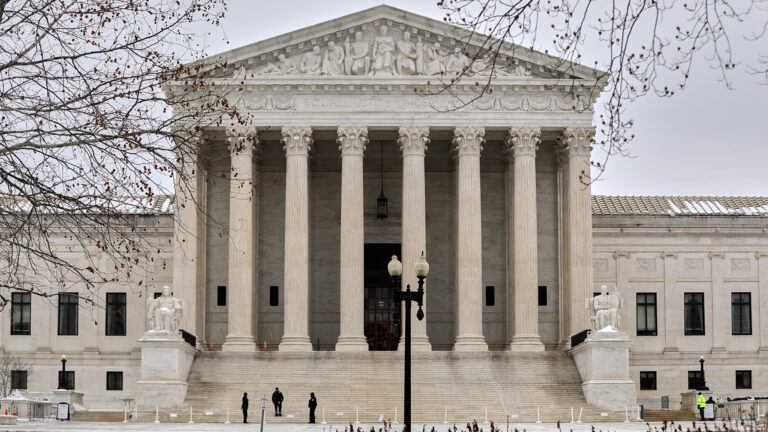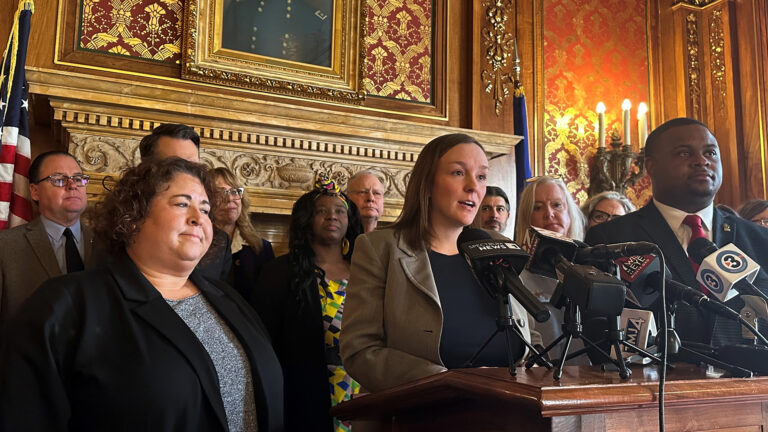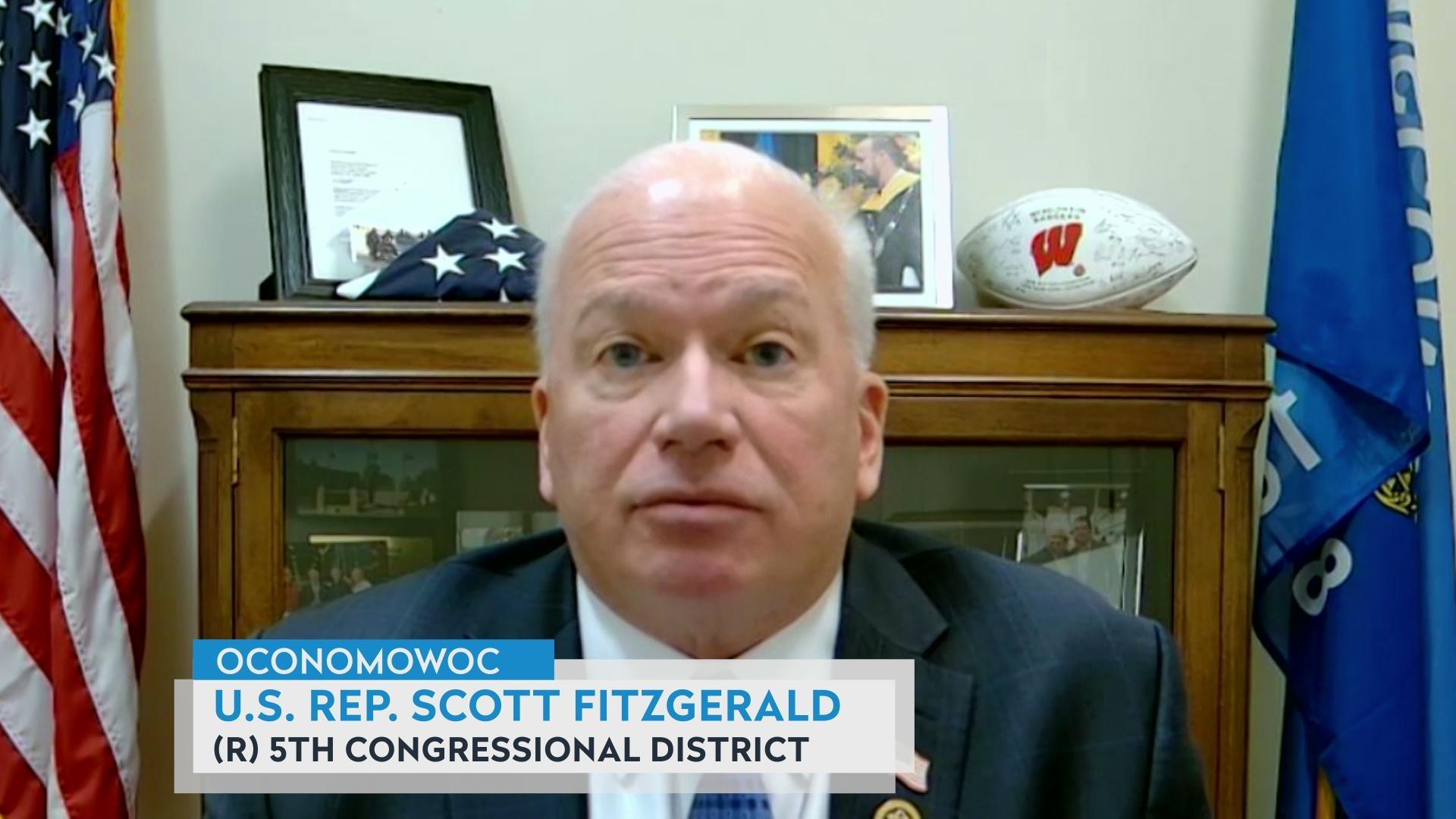US Rep. Gwen Moore on the start of a new Trump presidency
By Frederica Freyberg | Here & Now
January 24, 2025
U.S. Rep. Gwen Moore, D-4th Congressional District, discusses her outlook for President Donald Trump's second administration following an initial series of executive orders and the Jan. 6 pardons.
VIDEO TRANSCRIPT
Frederica Freyberg:
On the other side of the aisle, Wisconsin Democratic Congresswoman Gwen Moore, who represents Milwaukee, joins us for her take of the quick action on the part of President Trump. And Congresswoman Moore, thanks very much for being here.
U.S. Rep. Gwen Moore:
Oh, thank you for having me, Frederica. Happy New Year.
Frederica Freyberg:
You too. How do you regard the newly installed Trump administration?
U.S. Rep. Gwen Moore:
Well, I'll tell you, there really aren't any great surprises. He sort of campaigned on these things. A lot of people said, "Oh, he wouldn't do that, oh, he's just exaggerating." But he is really focusing in on some of the things that he promised, like sort of trying to suspend birthright citizenship, which, of course, is a constitutional provision, which has already brought, I think, 22 states to the table with regard to litigating that, including our own Attorney General Josh Kaul in Wisconsin. He said that he would put tariffs on our neighbors to the north and south, usurping the U.S. treaty with Canada and Mexico, which, of course, he executed. And of course, that will be very disruptive, particularly to our farm community, and I think that he maybe plans to backfill that with general appropriations to farmers. But I do think that it will be very disruptive to our economy. He's talked about increasing sort of trade wars and so on with China, really using some IRS revisions that have never been used before. So I just think that it's going to create a lot of chaos, and hopefully the very narrow margins that are in the House and in the Senate will force Congress to bring some cooler heads to the table to really examine the outsized portions of this. I'm thinking of what happened in the transportation space just a couple of days ago, where there was some sort of disruptions, and states were complaining about some transportation policies that he put out. So hopefully, we'll be able to see the Senate stand up to him, even if the House can't.
Frederica Freyberg:
So as you said, the president is making good on his campaign promises. What's your reaction to his pardons of the January 6th defendants, including 11 of them from Wisconsin?
U.S. Rep. Gwen Moore:
I can tell you, Frederica, maybe I'm cowardly, but I'm terrified. One of my staffers said that she went to the cafeteria in this building, and one of the January 6th people were there. I do know that most of the nonviolent, you know, little old ladies that had handmade signs were not the people who were indicted and jailed. The people who were indicted and jailed, I mean, they attacked police officers, they directed people to be violent, they had caches of — and I'm terrified, and my staff, I mean, they were actually in this building. I'm scared of them, and I do think that we have seen Republicans here, you know, who are very, they're very, very careful not to criticize Trump, but we have seen them stumbling over their words as they have been stunned by this. I think they thought that there would be a little bit more parsing — this one and that one — but these 1,500 commutations and releases are absolutely stunning, and I think that it's going to be very difficult, you know, to talk about the law enforcement and initiatives in this government when we have let all these lawless people out. And, you know, I agree with some other analysts and critics that say we can bet that we're going to see some of these people again. There are very few of them that are going to just learn their lesson, and take their pardon, and just go back into society. Hopefully, some of them will, but we're going to see some of these jokers again, and that is very terrifying.
Frederica Freyberg:
As to pardons, what do you think of Joe Biden's pardons to his own family and members of the January 6th Committee?
U.S. Rep. Gwen Moore:
Well, you know, I think some of the January 6th Committee members didn't necessarily think they had done anything wrong, and I don't think they did anything wrong. But I think Joe Biden was thinking, you know, when you just think about Trump's entire inaugural day he spent complaining and whining about how badly he was treated, and all the people, you know? So I do think that even though they did nothing wrong, I think that it would spare them from hiring lawyers and protecting themselves against nothing. So that probably was a sage thing to do. I don't know why he felt that he had to pardon his family or anything like that, but you know, we've seen, Trump promised that he would have an administration focusing on revenge, and I think he wanted to spare his family that, including the the January 6th investigators. In terms of Hunter Biden, I didn't necessarily think that he would pardon him, and I bet anything he would not have pardoned Hunter if he thought that there was a Justice Department that was going to be fair to his son. What I have heard — I'm not a lawyer, Frederica — but what I have heard is that any other person with this same set of crimes would not have been in jail, or had a case brought against them at all. And in terms of signing some document saying, "Are you on drugs" or something before you can get, buy a weapon, honestly, has that, is that enforced by anybody? You know, no telling how many alcoholics, or former drug addicts, or whatever have weapons. I certainly would love to see the numbers of weapons decrease in this country, but I do think that he was trying to protect his son from extreme vindictiveness.
Frederica Freyberg:
Back to immigration policy, Donald Trump's new executive orders effectively shut the border, end asylum, and as we've discussed a call to end birthright citizenship. What are your constituents saying to you about this, again, not unexpected news?
U.S. Rep. Gwen Moore:
Well, you know, one of the things that I think is that nobody wants violent criminals in their community, and I think to the extent that Trump is focusing on getting violent criminals out, this is something that probably has widespread support. Nobody thought that abuela, who's been here for 40 years and hasn't bothered anybody, was going to become one of the victims of this. And so, I think that if he is enabled to go further than that, people will be concerned — like the Dreamers, for example. You know, 78, 80% last time I checked, of Americans think that the Dreamers should have a path to citizenship. After all, these are our children. They speak English. They've benefited from having a public education. They're talented. We don't have a, we have a worker shortage in this country, and there's no reason to send our kids back to some country that they don't even know about. And I think that if he picks on the Dreamers, we might see some rising up from the electorate. It depends on how he executes this, but immigration was one of the issues, getting control of the border was one of the issues he campaigned on, but I do think that our Constitution still provides the ability for people to seek asylum. So we might find a lot of litigation with regard to how he specifically administers, as it were, these executive orders.
Frederica Freyberg:
So we asked Senator Johnson about Donald Trump's rescinding of Biden's order on the cost of prescription drugs, and he said he just didn't think that that would make a big difference. What do you think?
U.S. Rep. Gwen Moore:
Well, I'll tell you this. We capped the cost of insulin at $35 a month. Now, I have no idea why insulin has been costing people some, is upwards $500 a month for all of the medication, the paraphernalia that goes around it. But, I mean, if he does that again, there is not anybody who doesn't have a relative who's not a diabetic. Diabetes is one of the costliest disease in America, not just to institutions and the medical field generally, but to individuals, and I think that, you know, this $35 a month cap has been a relief to Americans in all sectors of our society, and I think that there will be consequences if this is rescinded.
Frederica Freyberg:
So also the administration is aggressively, as you know, dismantling DEI programs and efforts within the federal government. How does that sit with you?
U.S. Rep. Gwen Moore:
Well, I can tell you that the military is certainly going to push back hard against the DEI programs. They need DEI. I mean, if they're trying to recruit, you know, some spies to go into some of these Muslim countries, they can't very well send some white man over there, you know? If they, the military really relies on DEI — the CIA, the FBI — to complete their missions. This will undermine their operations tremendously. And so, I think that the pushback you're going to get is from the military in particular. They're not, they just cannot function without DEI. You know, some other things that he's talking about — the Inflation Reduction Act — it was so funny. I'm the vice-ranking member of the Ways and Means Committee this cycle. And so, yesterday, we listened to testimony from members of Congress, and I mean, Republican after Republican after Republican came and sat before us and talked about how the IRA, which is where the prescription drug provisions came from, talked about how it was partisan, but pleaded with the panel Republicans to take a scalpel to this and not a big knife, or sword, because they said that these energy-related legislation EV things are creating great investment in our country — and prescription drug, I think, item is on par with that. So we had Republican after Republican after Republican begging the Republican leadership, you know, not to totally dismantle everything in the Biden administration's IRA bill.
Frederica Freyberg:
That being the Inflation Reduction Act.
U.S. Rep. Gwen Moore:
That's right.
Frederica Freyberg:
So from your perspective, what will the next four years look like, and what can those in opposition of many of these things like yourself do about it?
U.S. Rep. Gwen Moore:
Well, we're not talking about four years. We're really talking about two years. I think that if the Republican Party overreaches on some of these items, like, for example, trying to get rid of the premiums — the Affordable Care Act, Obamacare premiums — like they tried to destroy the ACA, and you had John McCain doing his thumbs down, it is so popular and so important that if they try to overreach on items like that, in two years, it will subject them, I think, to losing the House of Representatives for sure, and maybe even flipping the Senate. Then you'd have Donald Trump in the White House with that particular configuration of the legislature. I mean, we still, you know Trump wants to take over all of the institutions of government, and I think that if he overreaches, as he's already starting to do, that he will pay a price.
Frederica Freyberg:
All right...
U.S. Rep. Gwen Moore:
... because the American people, the American people will, they will react. I mean, there were 85 million eligible voters that didn't vote. So this notion that he has some sort of mandate to just do anything he wants to is not the case. Some of those 85 million people will react. You know, one of the things they want to do is to block grant Medicaid, and I think that if they do that, seniors in nursing homes in particular are going to catch it. They will find themselves in nursing homes with severe staff shortages, because Medicaid won't be there. Their loved ones will be maltreated, and this, I think they'll pay a price for that.
Frederica Freyberg:
All right, Congresswoman Gwen Moore, thanks very much for your time.
U.S. Rep. Gwen Moore:
Thank you.
 Passport
Passport











Follow Us